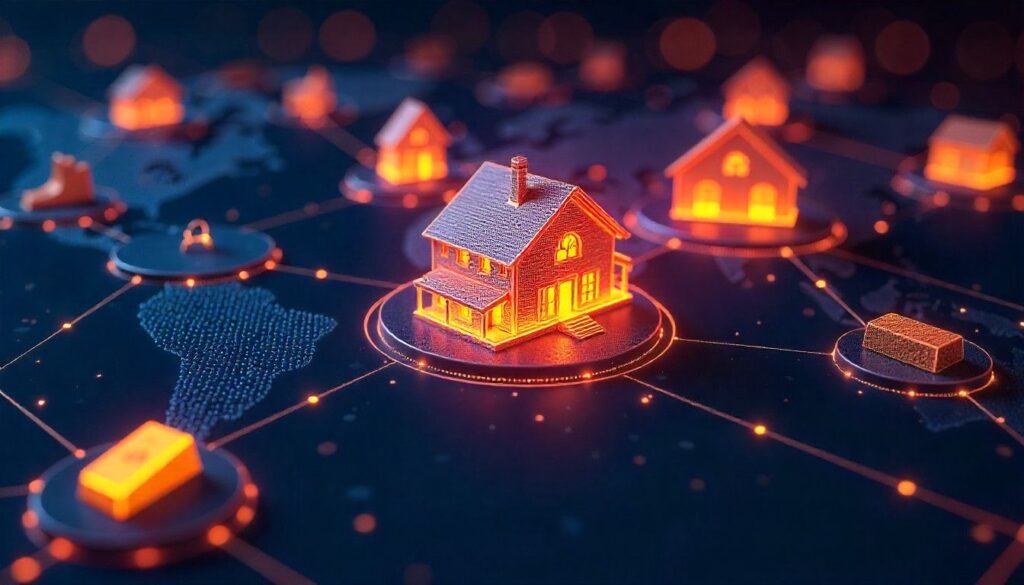
What Are Tokenized Real-World Assets (RWAs)?
Tokenized Real-World Assets (RWAs) are physical things like houses, gold, or collectibles turned into digital tokens on a blockchain. You can own a small piece of these valuable assets and trade them easily. Investors anywhere in the world can access them easily, and every transaction is recorded transparently, so ownership is clear and secure.
Tokenized RWAs let anyone take part in markets that were once only open to big institutions or wealthy investors. Blockchain keeps every transaction secure and easy to verify, while making it easier to trade real-world assets.
What is Tokenized Real Estate and How Does It Work
Tokenized real estate turns properties into digital tokens so that investors can buy and sell small shares instead of the whole property.
How it works:
- The property is legally registered, and ownership details are recorded.
- Smart contracts generate tokens representing fractional shares of the property.
- Tokens are tradable on marketplaces, allowing global investors to participate.
Benefits:
- Liquidity: Trade fractions instantly.
- Global access: Anyone worldwide can invest.
- Transparency: Blockchain records ownership.
- Lower entry barriers: Start investing with smaller amounts.
Example projects:
- Propy enables tokenized property sales in the US and Europe.
- RealT allows investors to earn rental income through fractional property ownership.
Technology Behind Tokenization
Tokenization uses blockchain to turn real-world assets into secure digital tokens. Here’s how it works:
- Smart Contracts: These digital agreements automatically handle ownership, transfers, and any income from the asset. For example, rental income from a tokenized property can go straight to your wallet.
- Transparent Records: Every transaction is recorded on the blockchain and cannot be changed. It’s simple to verify who owns the asset and follow its history.
- Verification: Third-party audits and legal documents confirm that the assets backing the tokens are real.
- Cross-Chain Trading: Some tokens can move between blockchains using protocols like LayerZero, making trading faster.
- Security: Blockchain encryption and secure wallets protect tokens from hacking or fraud.
Tokenized Gold, Commodities, Bonds, and Collectibles
Gold: Tokenized gold, like Tether Gold (XAUT), represents ownership of physical gold in vaults. Investors can trade fractions globally with transparency and liquidity.
Read full blog on: Launch of USDT0 and XAUT0 tokens on the Solana blockchain
Commodities: Oil, grains, and other commodities can be tokenized on platforms like GrainChain, providing price transparency, faster settlement, and global market access.
Bonds: Tokenized government or corporate bonds, such as those offered through Ondo Finance, offer digital yield distributions and lower barriers for retail investors.
Collectibles: Collectibles, art, and luxury items can be split into digital shares on Mattereum, letting small investors participate while keeping assets authentic.
Cross-Chain Interoperability for RWAs
Tokenized RWAs can flow between blockchains, enabling quicker and lower-cost trades. Protocols like LayerZero, Axelar, and Wormhole handle secure cross-chain transfers.
Advantages:
- Access liquidity pools on multiple chains simultaneously.
- Reduce transaction costs and delays.
- Enable investors globally to trade tokenized assets seamlessly.
Advanced Use Cases
- DeFi Integration: Tokenized assets can be used as collateral to borrow or lend on decentralized finance platforms.
- Cross-Chain Yield Farming: Stake your tokens on different blockchains to earn extra returns.
- Fractional Real Estate Portfolios: Invest small amounts in multiple properties to create a diversified portfolio.
How to Invest in Tokenized RWAs
Investing is simple and accessible:
- Set up a blockchain-compatible wallet.
- Complete KYC/verification required by the platform.
- Choose the asset type: real estate, gold, commodities, bonds, or collectibles.
- Purchase tokens representing fractional ownership.
- Trade or hold tokens on supported marketplaces.
Considerations:
- Check local regulations before investing.
- Evaluate platform security and token authenticity.
- Compare potential returns to traditional investments like ETFs.
Risks, Future Trends, and Opportunities
Risks: Regulatory uncertainty, platform security issues, market volatility, and ensuring assets are genuine.
Future trends:
- Institutional adoption of tokenized assets is skyrocketing.
- Cross-chain liquidity and DeFi integration are expanding trading and yield opportunities.
- Upcoming projects include tokenized ETFs, global real estate marketplaces, and collectible fractional ownership platforms.
Tokenized RWAs are bridging traditional finance and DeFi, giving investors a secure, liquid, and accessible way to participate in real-world markets.
